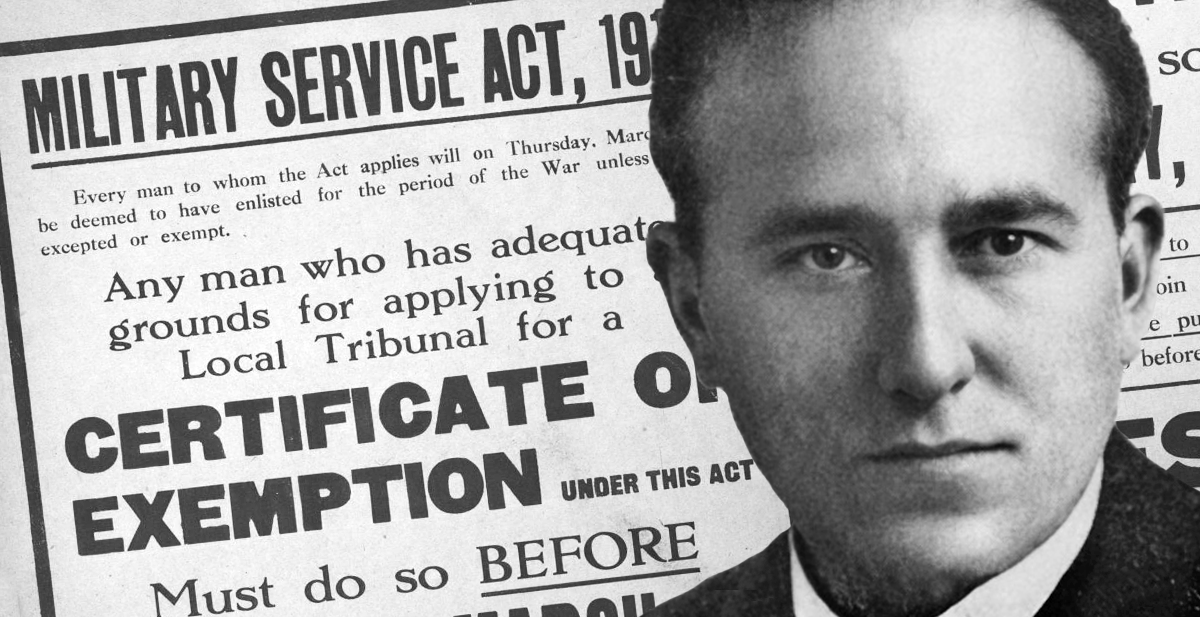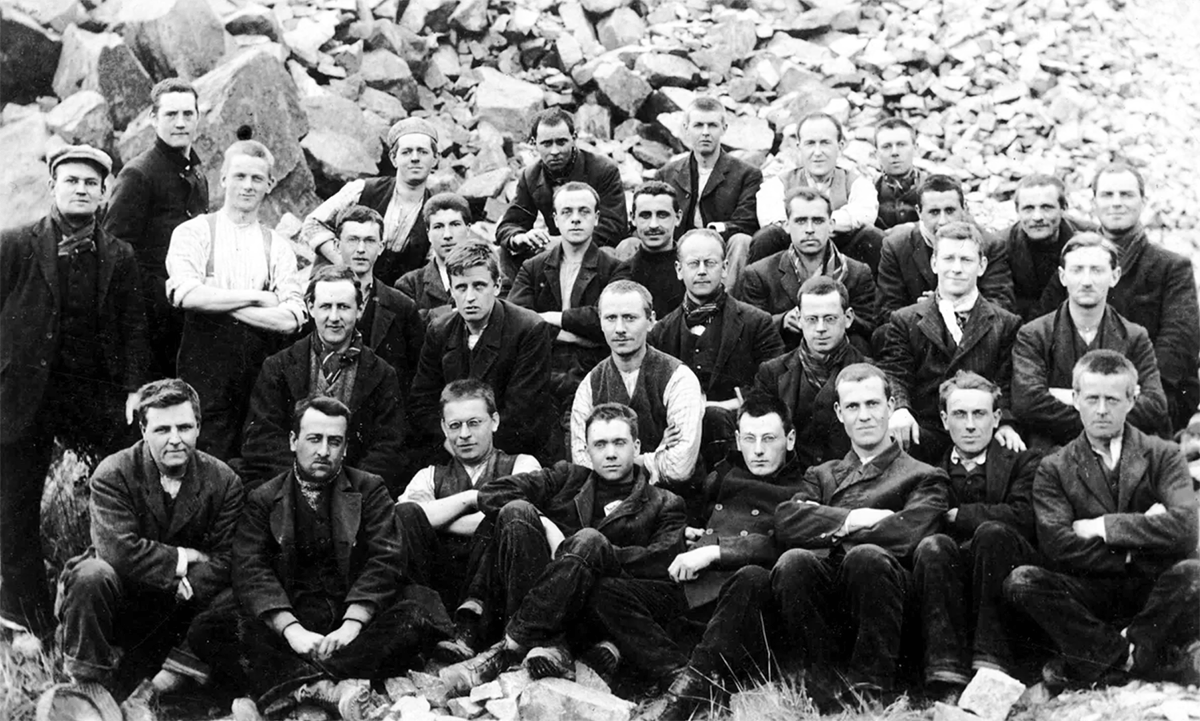A MAN OF CONSCIENCE - THE STORY OF NORMAN GAUDIE

Almost two and a half million men joined the British Army during the first 18 months of the First World War. By the end of 1915, however, it was clear voluntary recruitment would not satisfy the huge demand for manpower and, after much deliberation, the British government finally took the controversial step to introduce conscription.
Brought into effect on 2 March 1916, the Military Service Act required all men between the age of 18 and 41 to register for military service unless they held a certificate of exemption or were married, or widowed with dependent children, on the cut-off date of 2 November 1915. By May 1916, married men were also being called up. The introduction of conscription signified the end of Britain’s traditional all-volunteer army and marked the moment the country truly entered a state of total war.
While the Military Service Act compelled all qualifying and healthy men to serve in army, there were a number of exceptions. Among these were men already serving in the Royal Navy or Royal Marines, ministers of religion, and those in the regular, reserve or territorial forces who were deemed unfit for service overseas. Men could also pursue a certificate of exemption if they were currently in, or training for, an occupation that was expedient in the national interests, suffering ill-health, or if serious hardship would ensue due to exceptional financial or business obligations. Finally, men could also claim exemption on grounds of conscientious objection to the undertaking of combatant service.
For those men applying for exemption during World War One, the conscientious objectors (COs) were the most controversial. Faced with a system of tribunals and appeals, many were granted exemption only on condition they serve in non-combatant units such as the Royal Army Medical Corps (RAMC) and Non-Combatants Corps (NCC). The latter established in 1916 for the purpose of conscripting conscientious objectors into the army. Others were employed in munitions and similar jobs of national importance.
There were those, however, whose religious, moral or political beliefs led to an absolute objection to any form of contribution to the war effort, military or civilian. To the chagrin of the military authorities, 985 absolutists refused to comply with the Military Service Act during the First World War and were subsequently subjected to arrest, court-martial and imprisonment, in often squalid conditions. Among their number was Norman Gaudie, a 28-year-old accounts clerk on the North-Eastern Railway and reserve team footballer at Sunderland AFC. The son of a Quaker, Gaudie was a committed pacifist and held an absolute objection to any form of military service, including non-combatant, that would aid the war effort.
In March 1916, Gaudie made a claim for total military exemption at a tribunal in East Boldon. This was refused, however, and he was exempted from combatant service only. Having subsequently refused to comply with a notice to report to the army, Gaudie was arrested and appeared before Jarrow Police Court on 20 April 1916 charged with being absent under the Military Service Act. Despite pleading not guilty, Gaudie was fined 40s, which he said he did not intend to pay, and remanded in custody to await a military escort. Gaudie was then taken to Newcastle Barracks, where he was subsequently posted to the 2nd Northern Non-Combatant Corps based at Richmond Castle, North Yorkshire.
On his arrival, Gaudie refused all military orders and was part of a group of 15 other absolutists who were forcibly stripped, dressed in khaki uniform and locked into the guardroom cells. Soon to be known as the “Richmond Sixteen”, the group included Quakers, Methodists, Jehovah’s Witnesses and socialists, and would became a source of contention for both civil and military authorities. News of their treatment quickly reached the public domain and the subject was raised in the Houses of Parliament.
While few initially felt much sympathy for the plight of COs, the brutal manner of their incarceration began to attract significant criticism. Over time, others even grew to respect the steadfast beliefs of the men, particularly their determination to stick to their principles under such duress. On 13 May 1916, the Northern Echo published the following article describing the treatment of the men at Richmond Castle:
He heard on Saturday of a case of a man Yorkshire who was taken to Richmond, and because he resisted, he was frog-marched through the town and came back in a bleeding condition. This was not the kind of treatment to put a stop to this problem. These men might be unwise, stupid, foolish, but that was utterly un-English treatment. He knew of many cases, on the other hand, of extraordinary kindness shown by the military. Bullying should be sternly dealth with by the War Office. He wanted, too, to stop the large number of new cases that would arise unless something further were done.
For Lord Kitchener, however, already under huge pressure following the crippling losses sustained during the first two years of war, the situation was becoming increasingly damaging. Determined to take decisive action, he ordered them men to be removed from the castle and shipped to France. Once there, they would be on ‘active service’ and could be sentenced to death for any refusal of a direct military order.
On 29 May 1916, Gaudie and the other absolutists were forcibly removed from their cells and secretly transported to Southampton, where they were joined by another group of COs. The group were then shipped to France aboard the torpedo ship, St. Tudno, and landed at Le Havre the following day. After spending the night at Cinder City Camp, Gaudie and his group were transported north to Boulogne, where they were eventually housed at Henriville Camp. There they were told, incorrectly, that another group of COs had already been executed by firing squad.
Despite the threat of execution, the men maintained their stance and continued to ignore military orders. Eventually, they were given 24 hours to make a final decision and were allowed free time in Boulogne to discuss the matter. They were told if they accepted service in the NCC, their previous non-compliance would be forgotten. The following day, Gaudie and his group announced their intention to continue steadfast in their absolute objection to any form of war service. It was a decision that further antagonised the military hierarchy, who were now determined to address the problem once and for all.
On 6 June 1916, the group were sent to the docks in Boulogne and ordered to unload cargo from a recently-arrived ship. Refusing, the men were then individually asked if they were prepared to move the load, which fifteen of the 16 men said they were not. They were then taken to the near-by field punishment barracks and locked inside cramped and unsanitary cells. One of the men, Charles Herbert Senior, later wrote of the ordeal:
[We] were put into a dark cell with atrocious toilet facilities. It was down a passage and the only air that entered this cell had to get down this passage and through inch spaces between 8 to 10 inch board that formed the front of the cell, and no outlet. It reminded me of the Black Hole of Calcutta I had read about when I was a boy. The size was such that seven could lie close together on one side, five on the other side with our feet meeting in the middle.
On 13 June 1916, Gaudie and the 14 remaining Richmond men appeared before a Field General Court-Martial charged with: “Disobeying in such a manner as to show a wilful defiance of authority, a lawful command given personally by his superior officer.” It was a charge that carried the maximum penalty of death. Each man was then read the full details of the charge he faced: “[The man] at Boulogne, on 6th June, 1916, when, as one of a working party at the docks, he was personally ordered by Sergeant —-, the non-commissioned officer in charge of the party to commence work, did not do so, saying ‘My religious convictions won’t allow me to do it’ or words to that effect.”
During the Court-Martial, Gaudie spoke to explain the reasoning behind his refusal to undertake any form of military service:
My motive for refusing is because my ‘religious convictions’ prevent me from taking any part in the military system whatsoever and I am therefore bound to disobey any military orders in loyalty to those convictions, which are based on the spirit and teaching of Christ.
Inevitably, each man was found guilty as charged and on 24 June 1916, the group were sentenced in a very public show of military law. It was undoubtedly intended as a “deterrent to others”. Forced to stand in front of hundreds of assembled troops, the men were handed the maximum penalty – death by firing squad. There was to be a dramatic twist however. After a substantial pause, the men were subsequently informed the sentence had been commuted to 10 years penal servitude by the Prime Minister, Herbert Asquith MP.
It was a victory of sorts for the men and one that had been made possible by a sequence of events that had begun some weeks earlier. Shocked by the plight of the Richmond Sixteen, the MP for York, Arthur Rowntree, had begun a campaign for their release and had already succeeded in increasing public sympathy to their cause. Furthermore, news of their secret transit to France had also leaked out when a member of the group had thrown a note from the train window while it passed through London. For the government and prime minister in particular, it was a political nightmare.
Arguably, the most important factor in deciding the fate of the group, however, came on 5 June 1916 when the Royal Navy armoured cruiser, HMS Hampshire, hit a mine west of the Orkney Islands and sank with the loss of all but a few onboard. Among the dead was Lord Kitchener, who was travelling to the Russian port of Archangel for diplomatic talks. With Kitchener gone, the prime minister had little stomach for the political storm that would be caused should the Richmond Sixteen be executed. Nonetheless, for the group, difficult times still lay ahead as they began the journey home to begin their sentence. Writing in his 1922 book The Courage that Brings Peace, Gaudie said:
From the Boulogne guard room they were sent to Rouen and confined in a prison foul and disgusting beyond words, whence they were taken down to the quay to be shipped back to England. As they waited there a crowd gathered, for behind them was a hospital ship and some French officers in high comand were inspecting it. The officers left but the crowd lingered for a man had begun to address them. He praised the generals who would shrink from no sacrifice to drive the enemy out of France and the brave men who had come out of England to their help, and who now lay wounded and perhaps dying in the ship. Then he pointed to the ‘despicable cowards’ – who had come indeed, but in the face of the enemy had refused to fight. They should have been shot, but instead were on their way home. The crowd grew angry, dangerous, and jostled and pushed until they were almost thrown in the water. There was only one of the group who spoke French. He said to a small boy near him, ‘We are trying to follow the Good Saviour.’ The boy’s face suddenly changed and an old man near him asked what had been said. The words were repeated and repeated again, and behold slowly and silently the crowd moved away.
Despite seeing the Great War end in November 1918, Britain’s COs were to remain behind bars, causing a number to go on hunger strike in protest of their continued incarceration. In 1919, the last of the COs were finally released, having served as much as three years in unsanitary and draconian labour camps and civil prisons around the country. After their release, the men became social outcasts in a country that had seen almost one million of its men killed during four years of hardship. Many more suffered long-term physical and psychological effects – including Norman Gaudie, who was unable to resume his pre-war career in football. After returning to the north-east to become a director at a well-known sugar manufacturer, Gaudie died in Boldon in 1955, aged 67. He remained a committed pacifist and steadfast in his beliefs to the end.
In total, almost 16,000 men were recorded as conscientious objectors during the First World War, of which 6,000 were court-martialed and sent to prison. From that number, 1,330 absolutists refused to undertake non-combatant work of any sort, and faced a system of court-martials and, in the case of the Richmond Sixteen, the death penalty. At least 73 COs are also recorded to have died in prison.
The moral courage and conviction of the ‘Richmond Sixteen’ and other COs during World War One, was to have long-lasting implications for Great Britain and its military. Public perception changed in the decades that followed the armistice, and penal reform saw prison conditions improved dramatically. The men also had an immeasurable impact on the future growth of the peace movement, and helped lay the foundations for the 60,000 men and women who followed their lead during the Second World War, two decades later.


